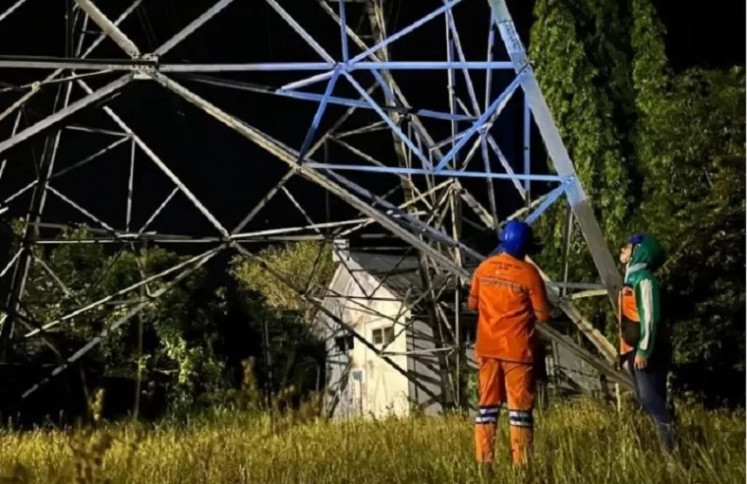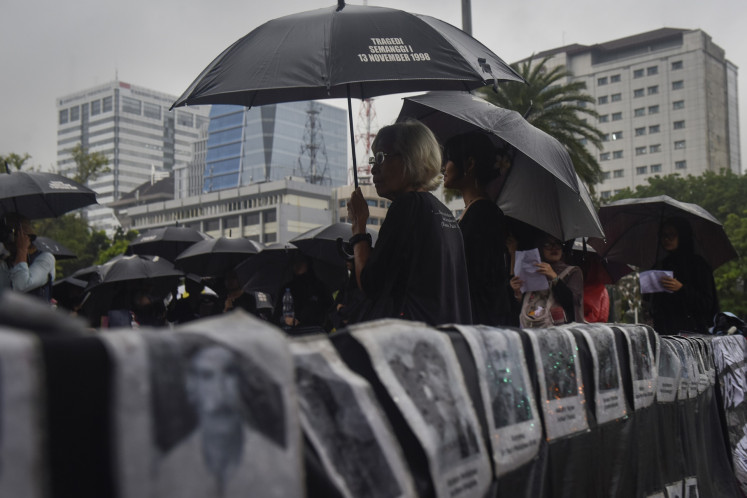Popular Reads
Top Results
Can't find what you're looking for?
View all search resultsPopular Reads
Top Results
Can't find what you're looking for?
View all search resultsSorry isn’t hardest word at all for Naomi Osaka
The media focus on Williams and accusations of sexism unfortunately blinded Americans and Williams’ supporters to an important lesson that was in clear display on the court, courtesy of Osaka: humility.
Change text size
Gift Premium Articles
to Anyone
S
orry seems to be the hardest word, says singer-songwriter Elton John, but Naomi Osaka shows that it’s the easiest of them all, and saying you’re sorry is the best gesture in a difficult or awkward situation. An apology goes a long way to easing tension.
“I’m sorry I won the match,” the 20-year old said as she accepted the US Open trophy, amid boos and jeers from the crowd at the Arthur Ashe Stadium in New York on Saturday. She had just beaten their favorite, Serena Williams, long regarded as the queen of world tennis.
It wasn’t exactly the kind of reception one would expect at such a prestigious tournament, certainly not for Osaka, born to Japanese and Haitian parents, winning her first-ever grand slam title.
But she instinctively apologized for their disappointment. Later in an interview, she said had felt with the crowd and would have done the same if she had been among them. She had grown up adoring Williams, 16 years her senior, as she had been building her own tennis career.
Osaka was not the target of the crowd’s derision. She was just an unfortunate bystander in a final match soured by endless rows between Williams and match umpire Carlos Ramos.
The tension between Williams and Ramos got to the point where she was punished by one game at a crucial moment when she was struggling to recover from a set down. When she lost the second set and the match, the delirious crowd was fully behind her. She had just been robbed.
No one can say how the game would have ended if the row had not gone that far, but we know Osaka was leading, and although19th in the world before the final, she had once beaten Serena Williams.
But that’s not really the issue here.
Days after Saturday’s final, Williams continues to steal the spotlight, with supporters and some fellow players backing her claim to be the victim of a bigoted umpire. Only in Japan did the headlines fete the first Japanese to win a grand slam title. (Osaka has dual citizenhip, US and Japanese).
The media focus on Williams and accusations of sexism unfortunately blinded Americans and Williams’ supporters to an important lesson that was in clear display on the court, courtesy of Osaka: humility.
Humility is the one character trait that seemed to be missing on the court that day, until, that is, Osaka apologized to the booing crowd. Humility is as important in competitive sports as in life. In sports, you win some and you lose some. Without humility, you will end up a sour loser many times.
Osaka could have told the crowd in her victory speech that she had won the trophy fair and square, but that would not have gone down well with the crowd. In tears, she apologized to them instead.
Going by the commentary after the match, and there is never a shortage in social media, few people paid attention to Osaka’s gesture on the court.
When someone says sorry, it can be interpreted in different ways, depending on the circumstances. One meaning of sorry is an apology for making a mistake or for offending someone. It can also be an expression of remorse or sympathy. Sorry is also a form of sarcasm if you don’t mean what you say.
No one in the crowd obviously blamed Osaka for taking the trophy away from Williams. To them, and to Williams, Carlos Ramos was the real culprit. But Osaka apologized anyway, and perhaps the Japanese blood in her obliged her to bow a little when she said she was sorry.
The tears accompanying her statement certainly tell you that she was sincere, not sarcastic.
Competitive sports with lucrative prize money in the millions of dollars put a lot of pressure on players. In tennis, we seem to have come to accept or tolerate a few tantrums, protestations, and even rude language. Given the high stakes, players are under such pressure that often they need to let off steam. It is even entertaining and regarded as part of the spectacle.
Humility, which includes saying sorry, is a rare quality among tennis champions nowadays. And it is about to get even rarer, as long as the focus remains on Williams’ behavior rather than Osaka’s.
Osaka showed us that saying sorry is the easiest thing to do. It helped her deal with the boos she received when she deserved better. It is not clear whether it helped the crowd. Maybe their boos drowned out the apology. Maybe they don’t care, but that’s really their problem.
If the culture of saying sorry was alive in professional tennis, maybe Ramos would have apologized when prompted by Williams and we would have watched a great final.
And I apologize if this article offends anyone (Yes, that’s sarcasm).










